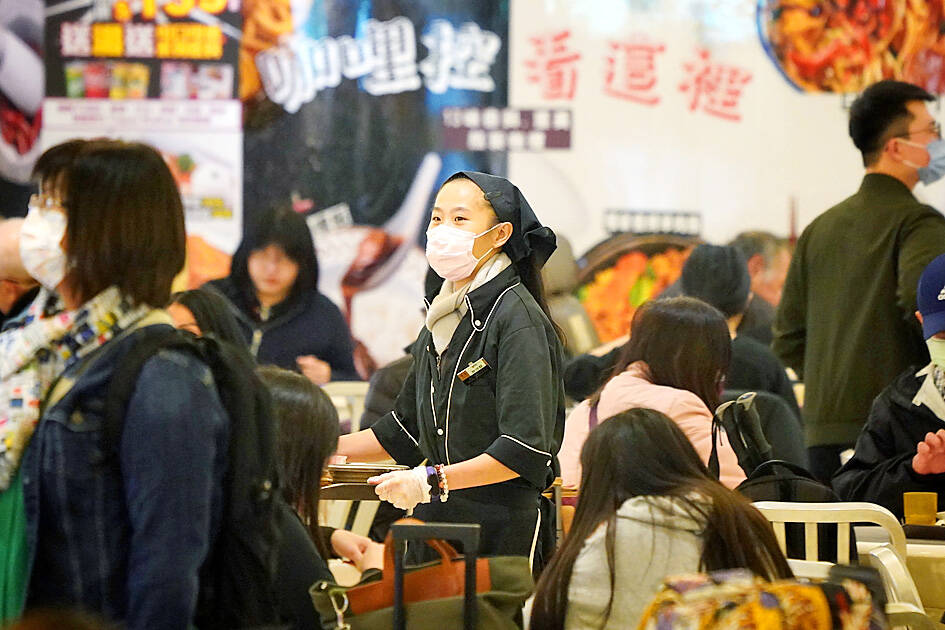The number of workers on official furlough programs dropped by about 5,000 over the past week as businesses in the tourism and manufacturing sectors recalled more than 1,600 employees from unpaid leave, the Ministry of Labor said yesterday.
The number of workers on furlough programs reported to the ministry fell to 13,499 from 18,492 on Tuesday last week, while the number of employers with unpaid leave programs also dropped by 644 to 2,017, the ministry’s data showed.
Department of Labor Standards and Equal Employment Director Huang Wei-chen (黃維琛) attributed the drops to seasonal factors and some companies in manufacturing and support services industries recalling staff from unpaid leave.

Photo: CNA
The number of furloughed workers in the manufacturing sector dropped by 1,798 to 4,439 over the past week, the ministry’s data showed.
Despite the decline, weakening global demand still affected export-oriented manufacturers, some of whom might implement unpaid leave programs after the Lunar New Year holiday, Huang said.
The number of furloughed workers in the support service industry, which is largely comprised of travel agencies, fell by 1,626 to 6,092 in the week, the ministry’s data showed.
Huang said the lifting of border controls for arrivals and a travel surge ahead of the Lunar New Year holiday helped boost the support service sector, significantly lowering the number of workers in the industry on unpaid leave programs.
The furlough situation in domestic demand-driven industries, such as hospitality and the retail and wholesale business sectors, also improved last week, he added.
As for the transportation and warehousing sectors, despite Taiwanese airlines terminating furlough programs, some air carriers that mainly provide flights to China still had furlough programs in place, Huang said.
The ministry updates its furlough data every week, and reports unpaid leave statistics for companies that have registered their furlough programs with the ministry.

BYPASSING CHINA TARIFFS: In the first five months of this year, Foxconn sent US$4.4bn of iPhones to the US from India, compared with US$3.7bn in the whole of last year Nearly all the iPhones exported by Foxconn Technology Group (富士康科技集團) from India went to the US between March and last month, customs data showed, far above last year’s average of 50 percent and a clear sign of Apple Inc’s efforts to bypass high US tariffs imposed on China. The numbers, being reported by Reuters for the first time, show that Apple has realigned its India exports to almost exclusively serve the US market, when previously the devices were more widely distributed to nations including the Netherlands and the Czech Republic. During March to last month, Foxconn, known as Hon Hai Precision Industry

Taiwan Semiconductor Manufacturing Co (TSMC, 台積電) and the University of Tokyo (UTokyo) yesterday announced the launch of the TSMC-UTokyo Lab to promote advanced semiconductor research, education and talent development. The lab is TSMC’s first laboratory collaboration with a university outside Taiwan, the company said in a statement. The lab would leverage “the extensive knowledge, experience, and creativity” of both institutions, the company said. It is located in the Asano Section of UTokyo’s Hongo, Tokyo, campus and would be managed by UTokyo faculty, guided by directors from UTokyo and TSMC, the company said. TSMC began working with UTokyo in 2019, resulting in 21 research projects,

Ashton Hall’s morning routine involves dunking his head in iced Saratoga Spring Water. For the company that sells the bottled water — Hall’s brand of choice for drinking, brushing his teeth and submerging himself — that is fantastic news. “We’re so thankful to this incredible fitness influencer called Ashton Hall,” Saratoga owner Primo Brands Corp’s CEO Robbert Rietbroek said on an earnings call after Hall’s morning routine video went viral. “He really helped put our brand on the map.” Primo Brands, which was not affiliated with Hall when he made his video, is among the increasing number of companies benefiting from influencer

Quanta Computer Inc (廣達) chairman Barry Lam (林百里) yesterday expressed a downbeat view about the prospects of humanoid robots, given high manufacturing costs and a lack of target customers. Despite rising demand and high expectations for humanoid robots, high research-and-development costs and uncertain profitability remain major concerns, Lam told reporters following the company’s annual shareholders’ meeting in Taoyuan. “Since it seems a bit unworthy to use such high-cost robots to do household chores, I believe robots designed for specific purposes would be more valuable and present a better business opportunity,” Lam said Instead of investing in humanoid robots, Quanta has opted to invest